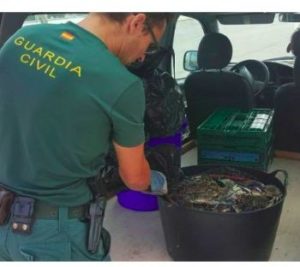By Andrew Atkinson
Guardia Civil operation across the province saw 19,000 Kg of illegal fishing confiscated for irregularities in conservation and size limits – with undersized seafood confiscated at the port of Altea.
Illegal fishing poses a serious threat to the sustainability of marine eco-systems, causing serious economic and social harm to regions, whose livelihoods depend on fishing.
Acting Minister for Agriculture, Fisheries and Food, Luis Planas, says the fight against illegal, unreported and unregulated (IUU) fishing constitutes a strategic priority for the Government of Spain.

A zero tolerance policy is needed to implement the situation, at a time the Ministry of Agriculture, Fisheries and Food has increased technical and legal resources.
During 2019 fishing inspections have increased, with fishing offences being re-classified, to strategies of serious and very serious.
Spain has actively stepped up their detection surrounding illegal fishing, leading to economic sanctions and fishing bans.
The General Secretariat for Fisheries of the Ministerial Department carries out control and inspection activities of fishing fleets – depicting control of quota consumption – tricand imports of fish products from third countries.
Spain has 137 maritime fishing inspectors, that undertook an astonishing near 10,000 inspections in 2018.

Collaboration is undertaken with the General Secretariat for Fisheries, with the Navy and the Civil Guard, along with the Maritime Service, Seprona and Air Service, in inspecting and surveillance of maritime fishing activities.
Spanish fishing worldwide is tracked by satellite – with figures approaching 2,000 vessels in 2018.
At Tabarca the marine reserve of the island – an infinity prairie of oceanic Posidonia of high ecological value – is located three nautical miles away from the Alicante coast.
Known as the Santa Pola cape, it is under the protection of Tragsatec, protected by a professional team of captains, divers and professional bodies, with illegal fishing patrols high on the agenda.
Guards presence carry out control of access to boats of the independent divers authorised, the control of the correct fishing regulations by local licenced professionals, and prevent recreational fishing by visitors.
Grupo Tragsa has been in charge of the maintenance and the protection of the marine reserve since 1994, under request of the General Secretariat of Maritime Fishing of the Ministry of Agriculture and Fishing, protecting it of the fishing interest in Tabarca Island.





